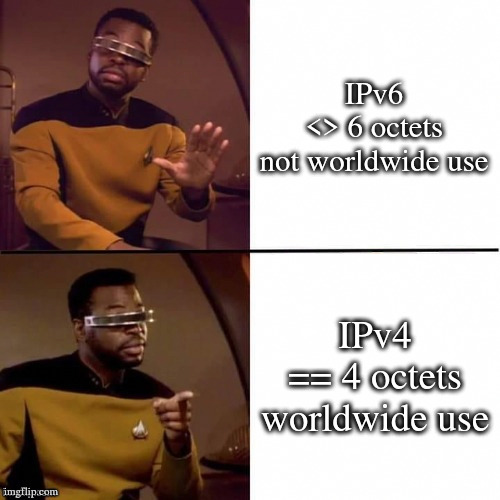this post was submitted on 19 Jun 2024
314 points (85.7% liked)
Programmer Humor
19587 readers
2075 users here now
Welcome to Programmer Humor!
This is a place where you can post jokes, memes, humor, etc. related to programming!
For sharing awful code theres also Programming Horror.
Rules
- Keep content in english
- No advertisements
- Posts must be related to programming or programmer topics
founded 1 year ago
MODERATORS
you are viewing a single comment's thread
view the rest of the comments
view the rest of the comments

Bro used <> instead of !=
What languages use this? I don't like it!
On the other hand it goes well with >= and <=. If >= means "either > or =" then <> means "either < or >", it checks out.
But I still don't like it.
BASIC. At least VB.
I think Excel formulas also use this, but it's been a long time so I might be misremembering.
Can confirm also BASICA, GWBASIC, QBASIC, and QuickBASIC
SQL uses it but yeah, not programming language :p.
I was on mobile so I didn't have a
.XComposeavailable to type≠.If you want to be able to write practically anything on mobile, including ≠, ≈, ‰, ℝ etc., have a look at Unexpected keyboard. No spellcheck or autocomplete, though.
I feel the opposite. On mobile I have much easier access to special characters. I just need to hold down characters to get more variants.
Yup, ≠ is right “under” =. As is ≈.
SQL is definitely a programming language. Most dialects are Turing-complete in some way. Some allow custom functions and stored procedures.
SQL
Depends on the dialect. I mostly use Presto and MySQL at work, and both allow
!=.Presto also lets you use
NOTfor booleans - instead ofWHERE foo = false, you can doWHERE NOT foo.Damn I never understood it but now it makes sense thanks to you
Yea it’s ugly 😭
logo does
F# definitely and maybe Haskell and OCaml as well? Elixir and Erlang use it as a binary concatenation operator.
Yes for OCaml. Haskell's inequality is defined as
/=(for ≠).<>is usually the Monoidmappendoperator (i.e. generalized binary concatenation).